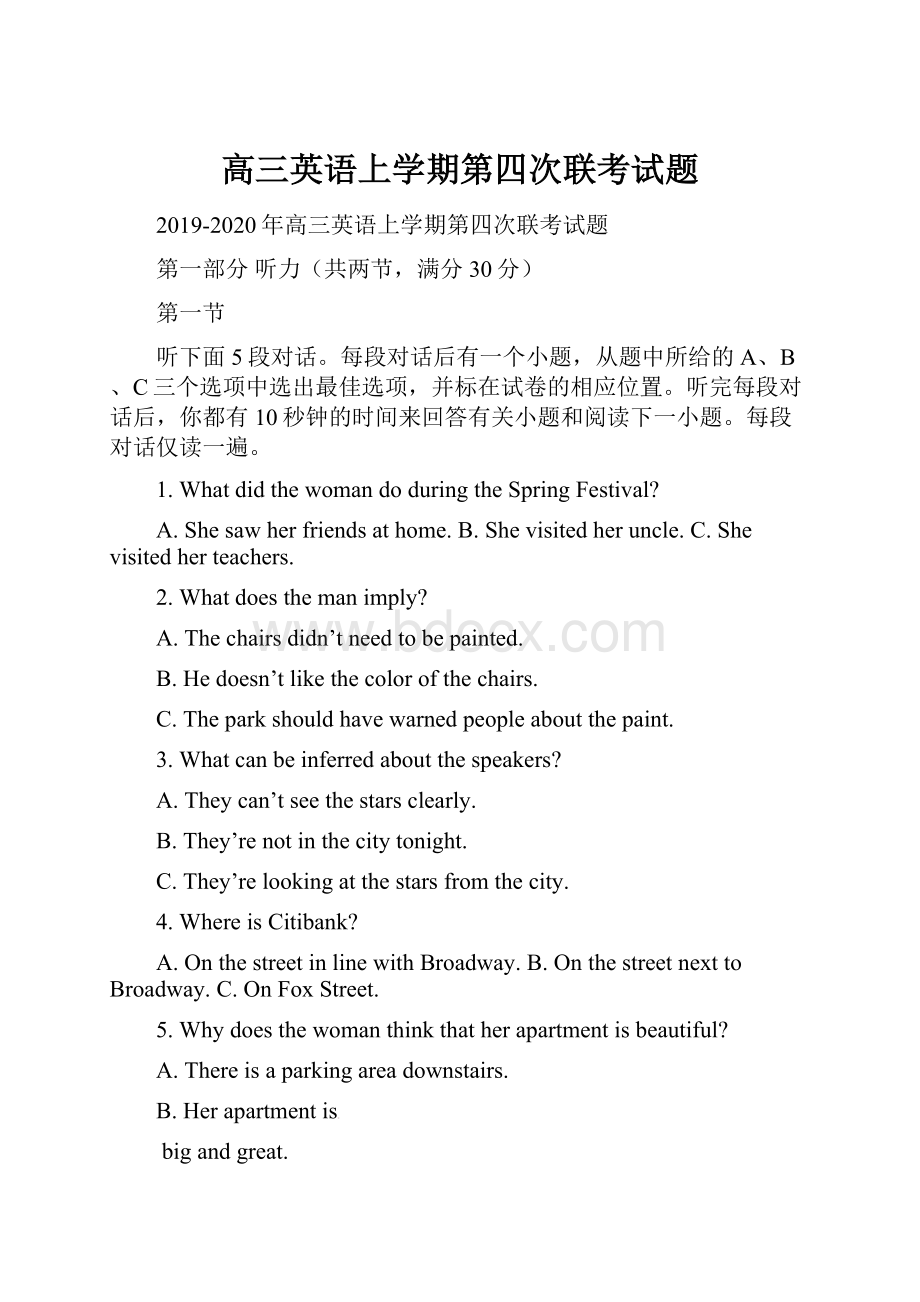高三英语上学期第四次联考试题.docx
《高三英语上学期第四次联考试题.docx》由会员分享,可在线阅读,更多相关《高三英语上学期第四次联考试题.docx(19页珍藏版)》请在冰豆网上搜索。

高三英语上学期第四次联考试题
2019-2020年高三英语上学期第四次联考试题
第一部分听力(共两节,满分30分)
第一节
听下面5段对话。
每段对话后有一个小题,从题中所给的A、B、C三个选项中选出最佳选项,并标在试卷的相应位置。
听完每段对话后,你都有10秒钟的时间来回答有关小题和阅读下一小题。
每段对话仅读一遍。
1.WhatdidthewomandoduringtheSpringFestival?
A.Shesawherfriendsathome.B.Shevisitedheruncle.C.Shevisitedherteachers.
2.Whatdoesthemanimply?
A.Thechairsdidn’tneedtobepainted.
B.Hedoesn’tlikethecolorofthechairs.
C.Theparkshouldhavewarnedpeopleaboutthepaint.
3.Whatcanbeinferredaboutthespeakers?
A.Theycan’tseethestarsclearly.
B.They’renotinthecitytonight.
C.They’relookingatthestarsfromthecity.
4.WhereisCitibank?
A.OnthestreetinlinewithBroadway.B.OnthestreetnexttoBroadway.C.OnFoxStreet.
5.Whydoesthewomanthinkthatherapartmentisbeautiful?
A.Thereisaparkingareadownstairs.
B.Herapartmentis
bigandgreat.
C.Shecanseetheparkdownstairs.
第二节
听下面5段对话或独白。
每段对话或独白后有几个小题,从题中所给的A、B、C三个选项中选出最佳选项,并标在试卷的相应位置。
听每段对话或独白前,你将有时间阅读各个小题,每小题5秒钟;听完后,各个小题将给出5秒钟的作答时间。
每段对话或独白读两遍。
听第6段材料,回答第6、7题。
6.WhichofthefollowingisnotaBritishmagazine?
A.Reader’sDigest.B.PrivateEye.C.Spectator.
7.WhatdoweknowaboutBritishmagazines?
A.Theyareallpublishedweekly.
B.There’sagreatvarietyofthem.
C.Noteveryprofessionhasitsownjournal.
听第7段材料,回答第8至10题。
8.Howoldmightthemanbe?
A.72.B.75.C.78.
9.Whydidthewomancometotheneighborhood?
A.Tolookforhernewoffice.B.Tomeetherclient.C.Tomeetheroldneighbor.
10.Whereisthenewofficecomplex?
A.Nexttoabaker’sshop.B.Behindabaker’sshop.C.Nex
ttoaflowershop.
听第8段材料,回答第11至13题。
11.Whendidthemanbegintolineupthismorning?
A.At8:
15.B.At8:
45.C.At1:
30.
12.Whatdoesheexpecttosee?
A.Amovie.B.Atennismatch.C.Aplay.
13.Whatisthewoman’sprobablejob?
A.Areporter.B.Atennisplayer.C.Anactress.
听第9段材料,回答第14至16题。
14.Whatistherelationshipbetweenthespeakers?
A.Teacherandstudent.B.Motherandson.C.Schoolmates.
15.HowdidDavidplantofinishhisproject?
A.Byreferringtoasmanybooksaspossible.
B.Byco-workingwiththewoman.
C.Bycopyingpartofabook.
16.Whatdoesthewomanthinkismostimportant?
A.Davidshouldhandinhisprojectintime.
B.Davidshoulddohisownproject.
C.Thereshouldbebrilliantchartsintheproject.
听第10段材料,回答第17至20题。
17.Whenshouldyouarriveifyouareinvitedtoafriend’shouseat5:
00p.m.?
A.5:
08.B.4:
50.C.5:
50.
18.Whatisthetalkmainlyabout?
A.Whentoarriveatyourfriend’shouse.B.Howtogreetpeople.C.Howtobeagoodvisitor.
19.Whatdoesgivingalittlegifttothehostmean?
A.You’rewillingtospendmoney.B.Youwanttobeinvitedagain.C.You’reexcitedtobehisguest.
20.WhatdoesthespeakerthinkofthewaysheaddressedPaul’sparents?
A.Shecouldhavebeenmorepolite.
B.Shethinksitwashighlyproper.
C.Shethinksshewasveryrudethattime.
第二部分阅读理解(共两节,满分40分)
第一节(共15小题:
每小题2分,满分30分)
阅读下列短文,从每题所给的四个选项(A、B、C和D)中,选出最佳选项,并在答题卡上将该项涂黑。
Oneofmyneighborsusedtohaveabeautifultreeinherfrontyard.Herdadhadplanteditforherwhenitwasnothingmorethanatwig(树枝)andseveralyearslateritstartedtoshoottowardstheskywithamazingspeed.Soonitblessedherwithcoolingshadeinthesummerandglorious,goldenleavesinthefall.
Whenthetwo-daysnowstormstruckourtown,heavysnowfellonthetree’sbranchesthatwerestillfullofleaves.Theweightsplitthatlovelytreedownthemiddle.Itwassosadseeinghalfofitlayingonthegroundafterthestorm.WhenItalkedtomyneighborlater,
shesaidthatthedamagehadbeentoomuchandthattheentiretreewouldhavetobecutdown.Thankfullyshehadsavedafewsaplings(树苗)fromitthatshehopedtoreplantinthefuture.
Still,itwasashocktodrivebyherhousetheotherdayandseenothingbutastumpinherfrontyard.Imissedthattree.Imisseditsbeauty,itsleavesshinningintheafternoonsun.Imissedseeingitslimbsreachtowardstheheavens.Ithoughtthatthestumpwouldbeasadreminderofitslossforalongtimetocome.Mywonderfulneighbor,though,hadanotherplan.WhenIdrovebyherhometodayIsawatinybirdfeedersittingonthatstumpandacolorfulsongbirdhavingitsdinner.Itwassuchanaffirmationoflife.Itwassuchajoytosee.Icouldfeelmyheartsmile.
Lifebyitsverynatureisamixedbag.Ithandsusbeautyandtragedy,loveandloss,pleasureandpain.Whatwedowithit,however,isuptous.Wecanletitsplitusintwo,orwecanuseevenitshardesttimestomakeoursoulsstrongerandourheartsmoreloving.Wecanspenditcomplainingorwecanuseittohelpothers.
21.Weknowfromthefirstparagraphthat_____.
A.thetreegrewveryslowly.B.thetreewassostrongthatitcouldbearanyweight.
C.thetreeshoweditsbeautyandbenefits.D.theauthor’sneighborwasgoodatplantingtrees.
22.Theauthor’sneighborleftastumpinherfront
yardtouseitas_____.
A.agoodreminder.
B.aplacetofeedbirds.
C.aseatafterdinner.
D.abeautifulsculpture.
23.Whatdoestheauthormainlywanttoshowinthepassage?
A.Lifeisdeterminedbyourattitudetowardsit.B.Lifeconsistsofpainandsuffering.
C.Lifehasbeautyandtragedy.D.Lifeshouldbepleasantratherthanpainful.
B
Itmayhelpyoutoknowthatthereisnosuchthingasaperfectspeech.Atsomepointineveryspeech,everyspeakersayssomethingthatisnotunderstoodexactlyashehasplanned.Fortunately,suchmomentsareusuallynotobvioustothelisteners.Why?
Becausethelistenersdonotknowwhatthespeakerplanstosay.Theyhearonlywhatthespeakerdoessay.Ifyouloseyourplaceforamoment,wronglychangetheorderofacoupleofsentences,orforgettopauseatacertainpoint,noonewillbeanythewiser.Whensuchmomentsoccur,don’tworryaboutthem.Justcontinueasifnothinghappened.
Evenifyoudomakeanobviousmistakeduringaspeech,thatdoesn’treallymatter.IfyouhaveeverlistenedtoMartinLutherKing’sfamousspeech—"IHaveaDream",youmaynoticethathestumbles(结巴)overhiswordstwiceduringthespeech.Mostlikely,however,youdon’tremember.Why?
Becauseyouwerefixingyourattentiononhismessageratherthano
nhiswayofspeech-making.
Peoplecarealotaboutmakingamistakeinaspeechbecausetheyregardspeech-makingasakindofperformanceratherthanasanactofcommunication.Theyfeelthelistenersarelikejudgesinanice-skatingcompetition.But,infact,thelistenersarenotlookingforaperfectperformance.Theyarelookingforawell-thought-outspeechthat
expressesthespeaker’sideasclearlyanddirectly.Sometimesamistakeortwocanactuallyincreaseaspeaker’sattractivenessbymakinghimmorehuman.
24.Theunderlinedpartinthefirstparagraphmeansthatnoonewill .
A.besmarterthanyou
B.knowwhatyouaretalkingabout
C.dobetterthanyou
D.noticeyourm
istakes
25.Youdon’trememberobviousmistakesinaspeechbecause .
A.youfindthewayofspeech-makingmoreimportant
B.youdon’tfullyunderstandthespeech
C.youdon’tknowwhatthespeakerplanstosay
D.yourattentionison
thecontent
26.Fromthelasttwoparagraphs,theauthormeansthat .
A.givingaspeechislikegivingaperformance
B.thelistenersshouldpaymoreattentiontohowaspeechismade
C.oneortwomistakesinaspeechmaynotbebad
D.themoremistakesaspeakermakes,themoreattractivehewillbe
27.Whatwouldbethebesttitleforthepassage?
A.HowtoBeaPerfectSpeaker
B.Don’tExpectaPerfectSpeech
C.Don’tExpectMistakesinaSpeech
D.HowtoMakeaPerfectSpeech
C
Youhearthesamecomplaintallthetime:
“Mymemoryisterrible.”Isitallinthemind,ordorealchangestakeplaceinthebrainwiththepassingoftime?
Theansweristhatthebrain’scells,theneurons,declineanddiewithage.However,accordingtoProfessorArthurShimamuraoftheUniversityofCalifornia,peoplevarygreatlyinhowtheychangementallywithage,aswellashowmuchtheirmentalabilitydeclines.
Therearethreemainwaysinwhichmentalfunctionchanges.Thefirstconcernsspeed,suchashowquicklyyoucanreacttofast-movingincidentsontheroad.Driversintheirlateteenreactquicklybutoftendrivetoofast,whiletheover-60’saremorecarefulbutreactmoreslowly.Thistypeofmentalslowingresultsfromareductionintheefficiencywithwhichthebrain’sneuronswork.
Thefactthatadultsfindithardertolearnmusicalinstrumentthanchildrenpointstoasecondtypeofmentaldecline,thelossoflearningabilitywithage.Thepartofthebrainwhichisknowntocontrolnewlearningisparticularlysensitivetotheeffectsofaging.Themeanswehavetodependmoreondiariesandothermentalaidsaswegetolder,takelongertolearnanewlanguageandareslowertomasternewthingsatwork.
“Workingmemory”isthethirdbrainfunctionthatissensitivetotheeffectsofaging.Absent-mindednessoccursatallagesbecauseofimperfectionsintheworkingmemorysystem.Forexample,youmaycontinuallyloseyourglasses,orfindyourselfwalkingintoaroomofyourhouseonlytofindthatyoucannotrememberwhatyoucamefor.Suchabsent-mindednessalsooccursmoreoftenaswegetolder.
However,evidencealsoshowsthattheprinciple“useitorloseit”appliestotheagingbrain.ProfessorShimamurastudiedagroupofuniversityprofessorswhowerestillmentallyactive,andcomparedtheirperformanceonneuropsychologicaltestswiththatofothersoftheiragegroup,aswellaswithyoungerpeople.Hefoundthatonseveraltestsofmemory,themen